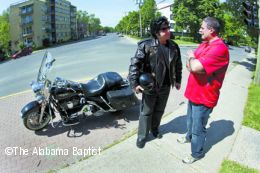In describing the spiritual condition of the people of Quebec, where he has been overseeing church planting since January 2009, North American Mission Board (NAMB) church planter Jacques Avakian calls to mind the boat crew in the story of Jonah.
“People in Quebec are spiritual and they’re seeking something but they’re not seeking the right spirit,” he said. “The people Jonah met on the boat were spiritual, but they didn’t know the right God because no one was sharing the truth with them.”
Avakian’s desire to share God’s truth with others developed early in his life. An Armenian born in Lebanon, he was a teenager when his family fled to Cyprus in 1978 because of war. Avakian grew up in the Armenian Orthodox faith but had attended Catholic and Maronite schools in Lebanon, and at the age of 7, he received Christ as his Savior after attending a Child Evangelism Fellowship class.
In Cyprus, he attended a Brethren school and remembers the day he promised God to serve Him if He let him live through the war. “I fully surrendered my life to Him when I was 15,” said Avakian, who moved to Montreal in 1986.
Now 47, Avakian is married to Martine Arbour, a French Canadian, and has two children (Sabrina, 14, and Sebastien, 12). He speaks fluent English, French, Armenian, Arabic, Turkish and Greek — an asset for anyone serving in such a multicultural area. He is the pastor of Eglise Renaissance de Long Sault in Grenville, Quebec, about an hour west of Montreal.
The Avakians are two of more than 5,000 missionaries in the United States, Canada and their territories supported by the Annie Armstrong Easter Offering (AAEO) for North American Missions. They are among the NAMB missionaries featured as part of the annual Week of Prayer, March 6-13. With a theme of “Start Here,” the 2011 AAEO goal is $70 million, 100 percent of which benefits missionaries like the Avakians.
“When I came to Quebec, God put it on my heart to start a new church,” he said.
In 2005, Avakian was introduced to Gary Smith, national catalyst for church starting in Ontario, Quebec and the Atlantic provinces (Canadian National Baptist Convention, CNBC).
“He and I clicked and he asked me if I’d be part of their leadership, so I joined as the Quebec church planter.” In 2007, Avakian became the regional church-starting strategist for Montreal, and since Smith’s move to Winnipeg, Manitoba, Avakian has been serving as the advocate for Quebec.
“I’m a starter, a visionary,” said Avakian, who has played a part in the startup of nine Quebec churches and is currently working with a 10th church in the process of officially affiliating with the CNBC. “Every morning, I get up to spend time with someone who is excited about starting a church and to help them be creative about the possibilities. My personal ministry is to see as many people as possible come to the Lord through any means and to see Christians grow and go through the maturity that God wants them to reach.”
Avakian points out that many people in Quebec are bitter because of past experiences with organized religion. “They’re not letting the walls be broken,” he said. “I want to challenge everyone to look forward and remember that God heals the past. It’s my personal mission that every soul who lives in the province of Quebec be reached … to pray that God would remove the strongholds in Quebec so that when people hear the gospel, they respond to it instead of react to it.”
To this end, Avakian is developing a prayer campaign called Prayer and Fasting 1771, which involves one day of prayer and fasting per week for seven weeks and then one week of daily prayer and fasting.
“We have to have strategies, but we often forget the initial commandment that Jesus gave that we need to pray first. There are cultural and generational strongholds that need to be removed by prayer and fasting.” Avakian estimated 1,000 communities in Quebec have no evangelical presence.
Though he believes in the importance of nourishing believers, Avakian feels that evangelism is of utmost importance and that church planting motivates evangelism.
“It’s not that we’re not satisfied with existing churches,” he explained. “But we believe in different models of churches. God has been moving in our and other conventions, and more people are talking about church planting. But most seminaries don’t even teach about church planting, so I’m getting in touch with some of them and encouraging them to focus on it more.”
Another of Avakian’s goals is to start a church-planting center that would train and send out church planters, so he’s developing a network of people who can provide help and resources.
By the year 2020, Avakian would like to see 200 CNBC churches in Quebec and 20,000 baptisms.
“I want to see churches with a vision to plant other churches. … I don’t want church to be a place where we go on Sundays to take a breath before holding it again for the rest of the week. Sunday should be a celebration of what we do during the rest of the week.”
The main challenge of working in Quebec is the shortage of laborers.
“We’re really short on people and resources,” Avakian said. “If people outside of Quebec invested in ministry here, we would see great things happen.”
Still Avakian believes evangelicals in Quebec need to live by faith and trust that God will provide the resources.
“We need workers who are willing to give up everything to serve God.
“People say Quebec is one of the toughest mission fields and I agree but what mission field is easy? I don’t believe anyone is beyond hope, no matter how tough they are. I haven’t met one person in Quebec who didn’t want to listen to what I was saying. If every believer in Montreal committed himself or herself to reaching one person a year, we would double ourselves in one year!” (NAMB)






Share with others: